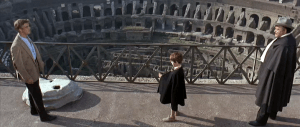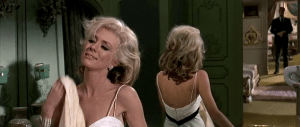 My notes on House of Cards (1968)
My notes on House of Cards (1968)
 An enthusiasm of mine is the writer Stanley Ellin, best known for short stories – the often-anthologised The Speciality of the House and the surprisingly-often adapted Nothing But the Best. I also like his novels, which are mostly international thrillers – The Luxemburg Run is a modern-dress Count of Monte Cristo and Star Light, Star Bright a terrific private eye story. Only a few have made it to the movies, which have tended to anonymise them. This glossy, cosmopolitan thriller directed by John Guillermin (scripted by Irving Ravetch and Harriet Frank Jr under a pseudonym) is solidly okay but a tad unexciting. The plot features a few limp surprises and many sketchy characters, plus some elements that play poorly forty-five years on … in one scene, the hero gets an old woman to talk by taking her sexpot daughter into another room and indicating that he’s going to rape the girl, who is then (hilariously) pouty that he doesn’t go through with it.
An enthusiasm of mine is the writer Stanley Ellin, best known for short stories – the often-anthologised The Speciality of the House and the surprisingly-often adapted Nothing But the Best. I also like his novels, which are mostly international thrillers – The Luxemburg Run is a modern-dress Count of Monte Cristo and Star Light, Star Bright a terrific private eye story. Only a few have made it to the movies, which have tended to anonymise them. This glossy, cosmopolitan thriller directed by John Guillermin (scripted by Irving Ravetch and Harriet Frank Jr under a pseudonym) is solidly okay but a tad unexciting. The plot features a few limp surprises and many sketchy characters, plus some elements that play poorly forty-five years on … in one scene, the hero gets an old woman to talk by taking her sexpot daughter into another room and indicating that he’s going to rape the girl, who is then (hilariously) pouty that he doesn’t go through with it.
 In Paris, ne’er-do-well and wannabe writer Reno Davis (George Peppard) ends a career as a boxer by throwing in the towel rather than take another battering. He has a weird meet-cute with a) brat Paul de Villemont (Barnaby Shaw), who shoots out the windscreen of the 2CV he’s in, b) said brat’s supposedly mad mother Anne (Inger Stevens), who has the benefit of Edith Head costuming, and c) the extended family circle of Paul’s late father, killed by a terrorist bomb in Algeria. Reno gets a gig as male role model to the boy, but soon tumbles that the whole family and their pals – who include jovially sinister (and gay) Leschenhaut (Orson Welles, underplaying in the circumstances) – are part of a worldwide fascist conspiracy that wants to start with nabbing back their estates in North Africa and then bring about a New World Order. An American (James Mishler) who is in the racket is especially het up about the spread of pornography and lax morals.
In Paris, ne’er-do-well and wannabe writer Reno Davis (George Peppard) ends a career as a boxer by throwing in the towel rather than take another battering. He has a weird meet-cute with a) brat Paul de Villemont (Barnaby Shaw), who shoots out the windscreen of the 2CV he’s in, b) said brat’s supposedly mad mother Anne (Inger Stevens), who has the benefit of Edith Head costuming, and c) the extended family circle of Paul’s late father, killed by a terrorist bomb in Algeria. Reno gets a gig as male role model to the boy, but soon tumbles that the whole family and their pals – who include jovially sinister (and gay) Leschenhaut (Orson Welles, underplaying in the circumstances) – are part of a worldwide fascist conspiracy that wants to start with nabbing back their estates in North Africa and then bring about a New World Order. An American (James Mishler) who is in the racket is especially het up about the spread of pornography and lax morals.
 After being framed for murder, escaping from various captivities, and having had a lot of plot explained to him, Reno has to go on the run Hitchcock-style with Anne, bundling up together in a sleeping car on a train to Rome (the stars don’t exactly strike sparks) and smooching in the Trevi Fountain to convince a cop they’re dumb tourist Dolce Vita fans rather than foraging for small change to pay for petrol. It turns out that the overbearing family doctor (Keith Michell, with dyed grey hair) has an unsurprising secret identity, but he gets killed before the climax, which involves Reno facing a fairly underwhelming attempt to murder him at the Colosseum and Welles’ stuntman taking a fatal tumble. It’s the kind of film that ducks out of any kind of aftermath – Paul has refused to accept his destiny as a fascist leader by properly shooting the hero, but is obviously damaged by his upbringing – in favour of a Francis Lai song.
After being framed for murder, escaping from various captivities, and having had a lot of plot explained to him, Reno has to go on the run Hitchcock-style with Anne, bundling up together in a sleeping car on a train to Rome (the stars don’t exactly strike sparks) and smooching in the Trevi Fountain to convince a cop they’re dumb tourist Dolce Vita fans rather than foraging for small change to pay for petrol. It turns out that the overbearing family doctor (Keith Michell, with dyed grey hair) has an unsurprising secret identity, but he gets killed before the climax, which involves Reno facing a fairly underwhelming attempt to murder him at the Colosseum and Welles’ stuntman taking a fatal tumble. It’s the kind of film that ducks out of any kind of aftermath – Paul has refused to accept his destiny as a fascist leader by properly shooting the hero, but is obviously damaged by his upbringing – in favour of a Francis Lai song.
 British character actors – Maxine Audley, Ralph Michael, Patience Collier, Peter Bayliss – play mostly French haut ton degenerates, are occasionally entertaining – though we have too many comedy bits (lecherous-wise train officials and cops) and the fake monk/hit man (Renzo Palmer) is a bit that should perhaps have been retired in the 1930s (though he improvs an explanation for his manicure when Peppard spots it). With Rosemary Dexter, who had an interestingly wayward Euro career – Juliet for Riccardo Freda, Vendetta for the Saint, Jesus Franco’s Justine, Eye in the Labyrinth. It has nice French and Italian locations, even if it visits a lot of tourist attractions – the de Villemont country chateau looks a lot like the one seen in black and white in Eye of the Devil around the same time.
British character actors – Maxine Audley, Ralph Michael, Patience Collier, Peter Bayliss – play mostly French haut ton degenerates, are occasionally entertaining – though we have too many comedy bits (lecherous-wise train officials and cops) and the fake monk/hit man (Renzo Palmer) is a bit that should perhaps have been retired in the 1930s (though he improvs an explanation for his manicure when Peppard spots it). With Rosemary Dexter, who had an interestingly wayward Euro career – Juliet for Riccardo Freda, Vendetta for the Saint, Jesus Franco’s Justine, Eye in the Labyrinth. It has nice French and Italian locations, even if it visits a lot of tourist attractions – the de Villemont country chateau looks a lot like the one seen in black and white in Eye of the Devil around the same time.

Thank you for this review – I’ve always enjoyed this film despite its shortcomings, and I bought the recent imprint BluRay, which features an enthusiastic audio commentary , making a strong case for the film. I’d love to get into Stanley Ellin – which of his stories/ novels are considered his best and where would be a good place to start?
Posted by Adrian Cini | April 22, 2022, 6:23 amThere are various short story collections – most are titled after his first, most famous story ‘The Specialty of the House’. Of the novels, I particularly like Star Light Star Bright, The Luxembourg Run, The Eighth Circle and Dreadful Summit. There’s a huge complete stories volume called The Dark Fantastic if you can find it.
Posted by kimnewman | April 22, 2022, 9:28 amThank you very much, I’ll get started this weekend.
There are a number of espionage/conspiracy films of the 1960’s where the original novels sound intriguing ( but are often difficult to get hold of). I’m thinking of “The Double Man” with Yul Brynner (“Legacy of a Spy” by Henry S Maxfield?) or “Assignment K” with Stephen Boyd or “Nobody Runs Forever” which I think is also based on a novel series – I wonder how many of these stand up now as novels?
Thanks again for the recommendations.
Posted by Adrian Cini | April 22, 2022, 10:03 am